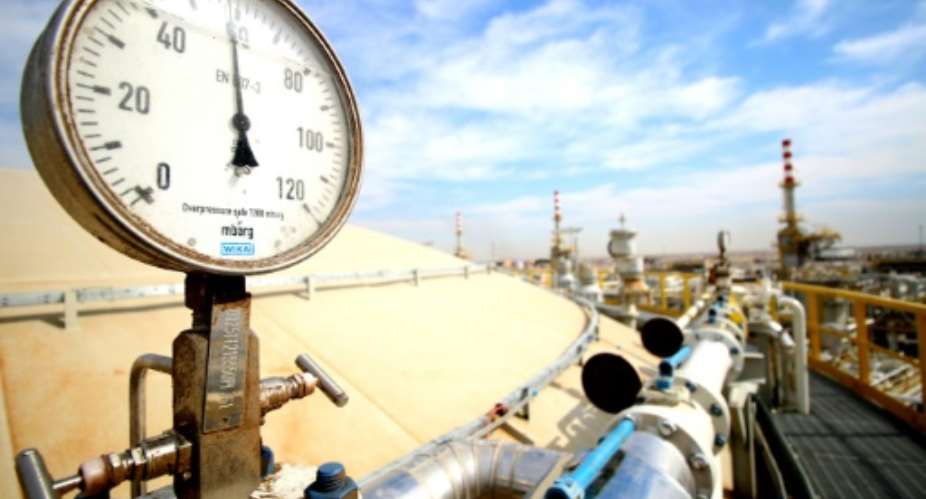Dubai (AFP) - The Middle East and North Africa region is facing challenging times because of lower oil prices, the fallout from regional tensions and civil conflict, the International Monetary Fund said Tuesday.
The IMF said in its World Economic Outlook report that a modest recovery in oil prices was likely to have little impact on growth in MENA oil-exporting countries.
"Since the end of World War II, countries in this region have suffered more conflicts than those in any other region in the world," the report said.
"The economic costs of conflict are massive for some countries and the spillovers large."
It said an estimated 10 million refugees "have mostly stayed within countries in the region -- for example, since 2010, refugees from Iraq and Syria have boosted the populations of Lebanon and Jordan by one-quarter and one-fifth, respectively."
Such conflicts incur significant economic costs.
After hitting a 10-year low in January, oil prices rallied by 50 percent to $45 in August, mostly due to involuntary production outages that brought balance to the oil market, the IMF said.
It forecast that prices will rise gradually from an average of $43 a barrel this year to $51 a barrel in 2017.
The IMF maintained its growth projections for most of the oil exporters in the Gulf Cooperation Council (GCC) that includes OPEC kingpin Saudi Arabia.
However, it upgraded its outlook for Iran on higher oil exports after Western sanctions over Tehran's nuclear programme were lifted, and for Iraq on increased production.
The IMF increased its 2016 growth forecasts for the Islamic republic to 4.5 percent, from 4.0 percent in April. It also raised next year's figure to 4.1 percent, from 3.7 percent.
In Iraq, the growth forecast for this year was lifted to a strong 10.3 percent due to higher than expected oil production.
But growth projections for Iraq in 2017 were severely lowered to just 0.5 percent because of security challenges and lower investments in the oil sector, the IMF said.
The report also maintained growth projections for the region's oil importers as a whole, although it said the economies of countries hosting millions of refugees from Syria's war have suffered immensely.
MENA oil exporters have lost hundreds of billions of dollars since the mid-2014 crash in crude prices, transforming huge surpluses into shortfalls.
"Most (countries) continue to tighten fiscal policy in response to structurally lower oil revenues, and financial sector liquidity continues to decline. Many countries in the region also remain affected by strife and conflict," the report said.
It maintained its growth forecasts for Saudi Arabia, the region's largest economy, at 1.2 percent this year and 2.0 percent in 2017.





 Tuesday’s downpour destroys ceiling of Circuit Court '8' in Accra
Tuesday’s downpour destroys ceiling of Circuit Court '8' in Accra
 SOEs shouldn't compromise on ethical standards, accountability – Akufo-Addo
SOEs shouldn't compromise on ethical standards, accountability – Akufo-Addo
 Father of 2-year-old boy attacked by dog appeals for financial support
Father of 2-year-old boy attacked by dog appeals for financial support
 Jubilee House National Security Operative allegedly swindles businessman over sa...
Jubilee House National Security Operative allegedly swindles businessman over sa...
 Nobody can order dumsor timetable except Energy Minister – Osafo-Maafo
Nobody can order dumsor timetable except Energy Minister – Osafo-Maafo
 Mahama wishes National Chief Imam as he clock 105 years today
Mahama wishes National Chief Imam as he clock 105 years today
 J.B.Danquah Adu’s murder trial: Case adjourned to April 29
J.B.Danquah Adu’s murder trial: Case adjourned to April 29
 High Court issues arrest warrant for former MASLOC Boss
High Court issues arrest warrant for former MASLOC Boss
 Align academic curriculum with industry needs — Stanbic Bank Ghana CEO advocates
Align academic curriculum with industry needs — Stanbic Bank Ghana CEO advocates
 Election 2024: We'll declare the results and let Ghanaians know we've won - Manh...
Election 2024: We'll declare the results and let Ghanaians know we've won - Manh...
